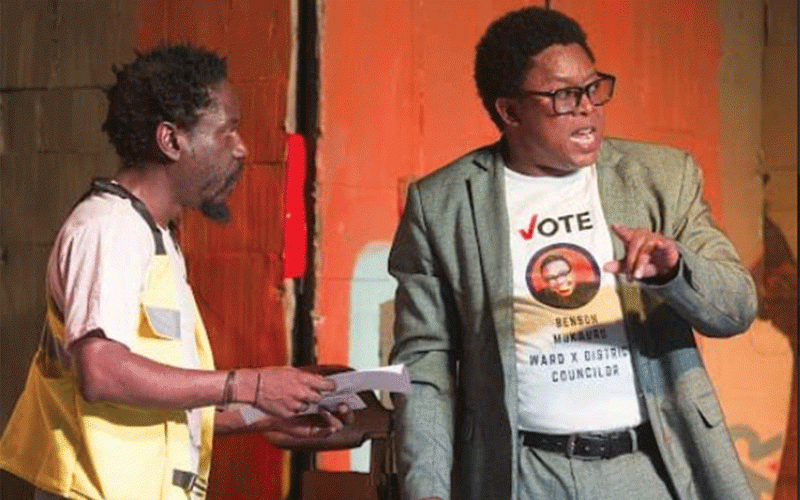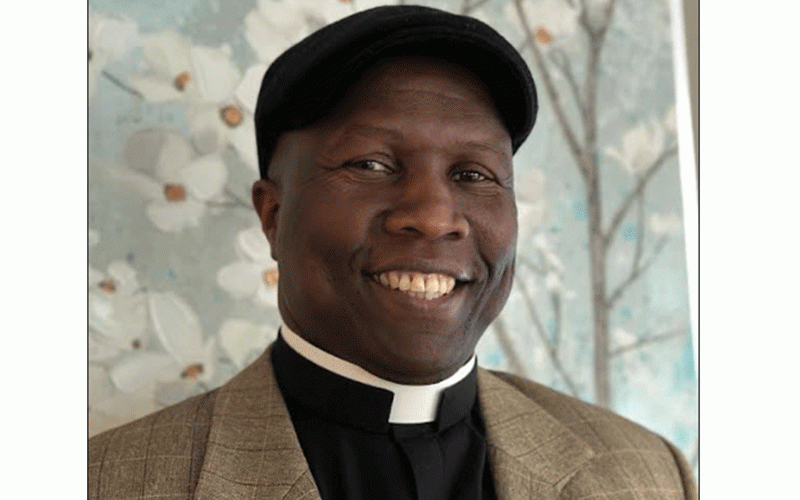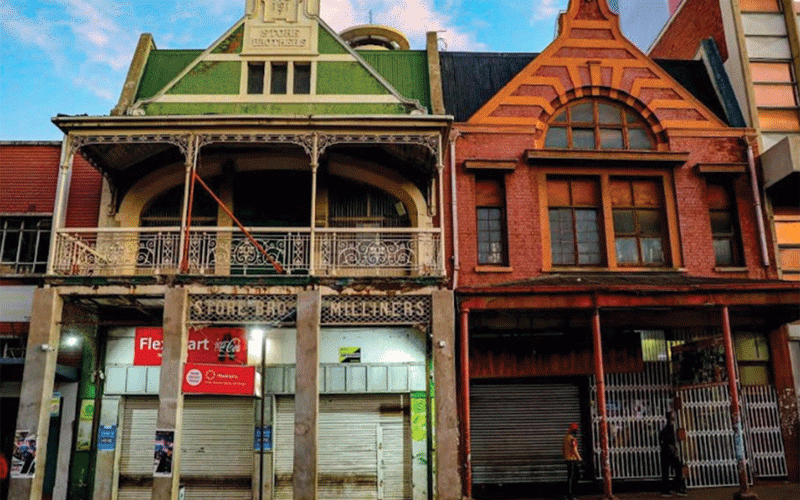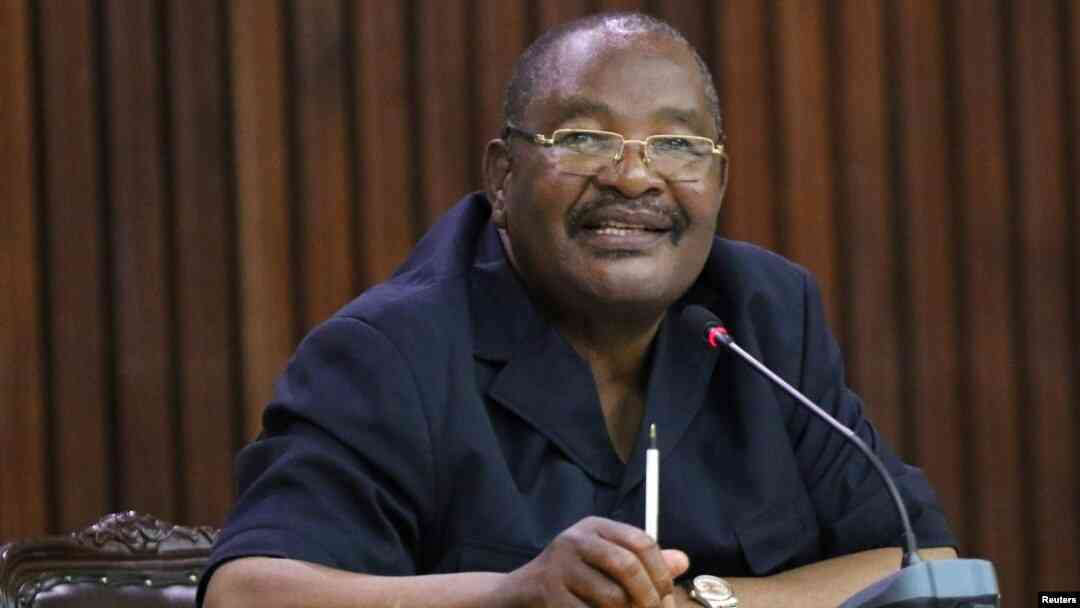
Stage, television actor and acclaimed caricaturist Michael Kudakwashe stars as a desperate politician with a lot of promises in ‘These Humans Are Sick’, a one hour thirty minute play that was written by Zimbabwean playwright Tatenda Mutyambizi.
The play is one of three brand new theatre productions being showcased as part of a 21-day “Africa Voices Now! A Festival of New African Plays presented by Almasi Collaborative Arts.
For the past seven days, Jason Mphepo Little Theatre in Eastlea, Harare has been showcasing powerful stage productions that are the result of intensive training workshops that saw top American theatre professionals visiting Zimbabwe to impart their knowledge and skills in writing, acting, directing and stage management.
The plays ‘Can We Talk?’ (Batsirai Chigama), ‘The Return’ (Rudo Mutangadura), and ‘These Humans Are Sick’ (Tatenda Mutyambizi) were selected after nine months of groundbreaking engagements.
A major highlight of this massive theatrical fiesta is the chance for one play to be selected for further development at the prestigious Public Theatre in New York City.
“We hope to make this an annual event,” wrote Danai Gurira, the Almasi executive artistic director in a statement. Directed by Charmaine R Mujeri, with Charlene Mangweni-Furusa as the assistant director, ‘These Humans Are Sick’ has been staged four times since the festival launched on October 18.
Upon entering the venue premises, theatre lovers first gather for multi-dimensional art experiences spanning poetry, literature, and live music performances, from acoustic sets to DJs. Guests are then guided into a walkway that simulates a tunnel. Within this space, they encounter a deeply immersive visual art installation, created from recycled materials by Mbare Art Space resident artist Takunda Regis Billiat.
On either side of the passage are canvases that show the photographic journey documenting Almasi's history. The artwork is made from found objects, mainly rubber from flip flops. The pieces are scattered along the sides of the tunnel, with some forming the walkway itself. This transformation turns the tunnel into a miniature museum, providing a spectacle as visitors walk slowly in admiration towards the entrance of the main attraction.
- Guzha appeals for funds for Harare Theatre in the Park facelift
- Desperate politician steals the show in ‘These Humans are Sick’
Keep Reading
When walking into the theatre, the audience is immediately confronted by a stage littered with refuse. It is the set for the play ‘These Humans Are Sick,’ designed to replicate the filthy streets of a Harare ghetto showing the blights, afflictions, and symptoms of decay that characterise a neglected environment.
At the centre of the play are five characters brought to life by an extremely talented cast comprising Dalma Chirevera (Melody), Ronald Sigeca (Prophet Japhet), Tinevimbo Chimbetete (Tindo), Chiedza Matabuka (Sasha) and the seasoned Michael Kudakwashe who plays Benson Mukauro, an ambitious and desperate politician who is running out of time to secure votes in order to be elected as the new ward district councillor in an upcoming election.
Tindo, a young street hustler with no particular speciality, is at pains trying to fend off municipal authorities from seizing the land on which his late father’s shop stands. His multi-tasking routine includes doubling as the campaign manager for Benson Mukauro. Tindo hopes that once he helps get Mukauro voted into power, the politician will use his influence to secure the title deeds for him.
In some scenes, Mukauro’s political campaigns take the play into the audience, breaking the fourth wall as the spectators become the electorate, receiving fliers to “vote” for him.
His campaigns occasionally seem to be in a conflict with those of a shantily dressed Bible-thumping prophet Japhet (played by Sigeca) who frequently interrupts Mukauro’s speech rallies at every opportunity with sermons and quotes from the Bible, which seem to contradict Mukauro’s rhetoric, making the audience roar with laughter but leaving Mukauro, who is running against time, furious.
All characters outdo themselves in portraying the everyday human experiences of a community in despair — one that is searching for a better life and longing for support, but pursuing these needs to extreme ends. For its effectiveness in addressing topical issues, the play was given a standing ovation.
The cast brilliantly and passionately portrayed themes of social justice, human behaviour, and community responsibility, all while incorporating a healthy dose of humour. However, some scenes are explicit and are only recommended for a mature audience, as the play is entirely uncensored and features strong language in various scenes.
“I simply hoped for a few nods and laughs, the ovation was validation for the honest work and it meant so much,” Mutyambizi told IndependentXtra.
“The energy of the play is a chaotic cry from the ghetto, and also the emotional silent moments, from people who are rarely seen or heard. It is fulfilling for the audience to be transported from one bit to the next. To watch an audience not only understand that desperation but rise to their feet was humbling,” he added.











